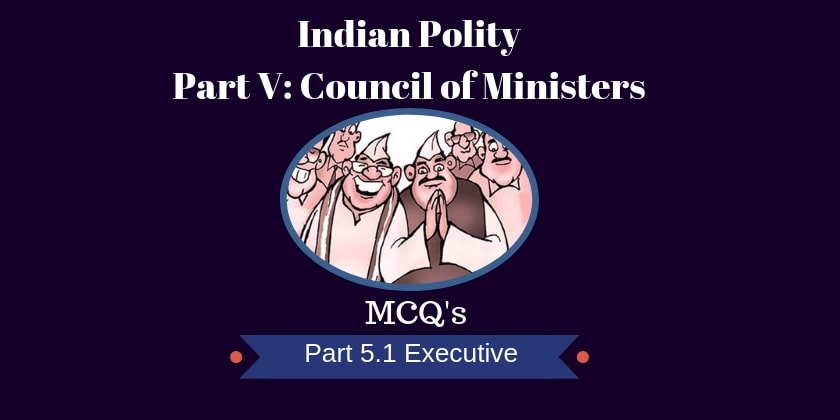11. The portfolios are allocated to the ministers by:
A. the President
B. the Prime Minister
C. collective decision of the Council of Ministers
D. individual choice
[toggle] Answer – B[/toggle]
12. The rank of the different Ministers in the Union Council of Ministers is determined by the:
A. President
B. Prime Minister
C. Cabinet Secretary
D. Speaker of Lok Sabha
[toggle] Answer – B[/toggle]
13. The executive power is vested in the President but it is actually used by him on the advice of :
A. the Prime Minister
B. the Council of Ministers
C. Parliament
D. None of the above
[toggle] Answer – B[/toggle]
14. Which of the following statements is correct?
A. The Council of Ministers are collectively responsible to the President of India
B. The Council of Ministers are collectively responsible to the Parliament
C. The Council of Ministers are collectively responsible to the Lok Sabha
D. The Council of Ministers are collectively responsible to the Prime Minister
[toggle] Answer – B[/toggle]
15. If a Minister loses a no-confidence motion, then:
A. the Minister resigns
B. the whole Council of Ministers resigns
C. Lok Sabha is dissolved
D. only Prime Minister and that Minister resign
[toggle] Answer – B[/toggle]
16. The two Houses of Parliament enjoy co-equal power in all spheres except:
1. financial matters
2. responsibility of the Council of Ministers
3. amendment procedure
4. election of President
A. III and IV
B. II, III and IV
C. I, II and III
D. I and II
[toggle] Answer – D [/toggle]
17. When the annual Union Budget is not passed by the Lok Sabha?
A. the Budget is modified and presented again
B. the Budget is referred to the Rajya Sabha for suggestions
C. the Union Finance Minister is asked to resign
D. the Prime Minister submits. The resignation of the Council of Ministers
[toggle] Answer – D [/toggle]
18. Article 75 includes among its provisions:
1. Prime Minister is to be appointed by the President.
2. The Council of Ministers shall be collectively responsible for the Lok Sabha.
3. The President may appoint a non-member as Prime Minister who must become a member of Parliament before the expiration of six months.
4. The Ministers shall hold office during the pleasure of the Prime Minister.
A. 1 and 2
B. 3 and 4
C. 2 and 3
D. 1 and 4
[toggle] Answer – A [/toggle]
19. If the Governor of a State is appointed the administrator of an adjoining Union Territory, he exercises his functions:
A. on the advice of his Council of Ministers
B. independently of his Council of Ministers
C. according to Parliament’s directions
D. according to the directions of the State legislature
[toggle] Answer – B[/toggle]
20. The real executive powers under Parliamentary Government rests with the
A. Prime Minister
B. Head of the State
C. Parliament
D. Council of Ministers
[toggle] Answer – D [/toggle]


It a very good for exam prep.
Thanks Manish sir